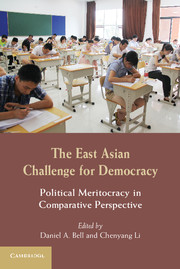Book contents
- Frontmatter
- Dedication
- Contents
- Contributing Authors
- Acknowledgments
- Introduction
- Section I The Theory of Political Meritocracy
- Section II The History of Political Meritocracy
- 6 Between Merit and Pedigree
- 7 A Society in Motion
- 8 Meritocratic Democracy
- Section III Realizing Political Meritocracy Today
- Index
- References
7 - A Society in Motion
Unexpected Consequences of Political Meritocracy in Late Imperial China, 1400–1900
Published online by Cambridge University Press: 05 June 2014
- Frontmatter
- Dedication
- Contents
- Contributing Authors
- Acknowledgments
- Introduction
- Section I The Theory of Political Meritocracy
- Section II The History of Political Meritocracy
- 6 Between Merit and Pedigree
- 7 A Society in Motion
- 8 Meritocratic Democracy
- Section III Realizing Political Meritocracy Today
- Index
- References
Summary
Introduction
Late imperial Chinese were on the move from 1400 to 1900. They regularly traveled along the waterways and roads of their extensive empire, moving up from villages to counties, townships, prefectures, provinces, and the capital. Why? To take the dynasty-wide civil service examinations! Once licensed by a local qualifying examination, millions of candidates traveled far and wide to take higher examinations. They relied on the fairness of the testing process to rise from the bottom up and share political power as civil servants within the state bureaucracy. Eligibility for the civil examinations required classical literacy, mastery of the orthodox content of the classical canon, and minimally commoner status. The dynasty legitimated those who passed the examinations to hold office and wield political, cultural, and legal power. Once in office, they became meritocratically appointed authorities.
Officials (guan 官) serving in the Ming-Qing bureaucracy claimed their “merit” (shixi 士習, lit., “cultivation of character”) entitled them to represent the people (min 民). Their merit derived from a classical education and passing examinations. Their education was premised on long-naturalized but still idealized social distinctions between literati (shi 士), peasants (nong 農), artisans (gong 工), and merchants (shang 商) in descending order of rank and prestige. Under the Ming dynasty, for example, sons of merchants were for the first time legally permitted to take the civil examinations. The longstanding Confucian fear that wealth trumped politics slowly eroded, and Ming authorities increasingly moralized wealth during a “silver age” of unprecedented commercialization, 1550–1650. Remaining occupational prohibitions still extended to Buddhist monks, Daoist clerics, and “mean peoples” (those engaged in “unclean” occupations). An unstated gender bias applied to all women and eunuchs.
- Type
- Chapter
- Information
- The East Asian Challenge for DemocracyPolitical Meritocracy in Comparative Perspective, pp. 203 - 231Publisher: Cambridge University PressPrint publication year: 2013
References
- 3
- Cited by



